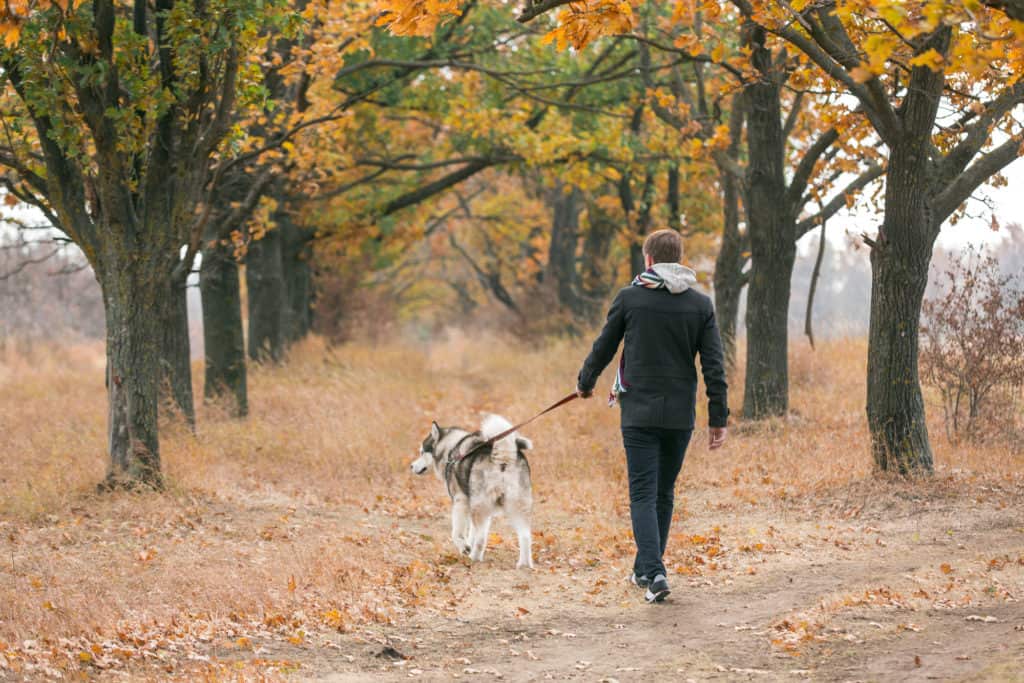Living in an apartment when you have pets, especially dogs, can be tricky. Many landlords and apartment management boards don’t allow certain dog breeds.
Even when they do, some dogs can have trouble adapting well to the small, enclosed living space of an apartment.
What about Huskies? These big, fluffy dogs are goofy and loyal, and they make for awesome pets. But are Huskies good apartment dogs? Read on to find out!
Are Huskies Good Apartment Dogs?
Huskies are not considered good apartment dogs. While all dogs are unique and some Huskies are better suited to apartment living than others; most dogs of this breed are too large, noisy, and energetic to be able to thrive in an apartment.
However, there are a few steps one can take to help a Husky acclimate well to apartment living.
5 Reasons Why A Husky May Not Be The Best Apartment Dog
1. High Noise Levels
Huskies are notoriously vocal. They love to talk and speak with deep, half-whining voices. It’s their form of communicating with their owners and those around them.
Whether they’re complaining, excited, or just feel like talking, their gruff and funny voices tend to be very loud. In an apartment situation, this can be a disruption to other people.
Aside from just regularly talking, Huskies also tend to howl a lot. Virtually anything can set them off and get them shouting at the top of their lungs, even their own vocalizations.
Things like a passing siren, a weird noise from a neighboring apartment, a funny sound on the TV, or the howl of another dog can lead to a cacophony of noise.
Worse still, it’s notoriously difficult to get a Husky to calm down enough to stop howling, much to the dislike of potential neighbors.
2. Cramped Or Small Living Spaces
Huskies are big dogs and need a good amount of space to move around in. Apartments are typically on the smaller side and may lack sufficient room to allow your Husky to live its best life.
Cramped spaces also breed more potential accidents and can cause discomfort for you and your dog as you both try to navigate life in each other’s personal space.
Small living spaces can also lead to health problems for dogs like Huskies, who are active and energetic. They can become overweight, face weakened bones or muscles, or suffer from lethargy and depression-like states as a result of a too-small apartment.
There are certainly bigger apartments out there that can be suitable for larger dogs, but their cost can be quite high.
3. Lack Of Outdoor Space
Apartments usually have little more than a small or medium balcony, which you likely won’t want to let your dog spend too much time out on anyway. After all, balconies are too dangerous to leave a dog unsupervised on them.
Huskies love outdoor space, and the American Kennel Club makes it clear that they want to run and jump and move a lot. In an apartment, that’s typically not possible.
This can cause a Husky to be overly energetic indoors, running around and bumping into people and things. This can potentially damage furniture, cause mild injury, or lead to damage that can be bad for renters.
4. Boredom
The American Kennel Club states that Siberian Huskies are dogs that like having jobs or tasks to fulfill. Without those things, they can become bored and listless, with that restlessness leading to poor behavior and acting out.
The mischievous breed, if not given something to do, will make its own fun – often at your detriment!
In a small apartment, it’s hard to ensure that a Husky has something to keep them occupied, or at least a space to take its boredom out safely.
Worse still, an apartment means that everything is more accessible to a bored dog’s nose and paws, and you might wind up dealing with a lot of tricky behavior as your Husky tries to keep itself occupied.
5. Destructive Tendencies
We’ve already briefly covered how Huskies will be destructive in their restlessness when not given enough exercise or enough things to do to occupy it.
This is already bad no matter where a Husky is, but it’s even worse in a small, contained living space.
Your dog will run into all the furniture around it, knock things off tables, and get into your cushions, and it’ll be quite a lot to deal with.
As such, you’ll have to work extra hard to ensure that your Husky’s needs are met to avoid these destructive behaviors.
5 Tips For Making Apartment Life Easier With A Husky
1. Provide Sufficient Outdoor Exercise
The most important part of managing a Husky as an apartment dog is ensuring that they gets all the exercise they need.
Too little will have your dog bouncing off the walls in a whirl of bored and frustrated energy. Tire your Husky out and they’ll be happy and satisfied indoors.

Luckily, the American Kennel Club explains that Huskies are extremely adaptable when it comes to exercise, so they’re able to thrive in urban environments.
Daily walks, play dates with other dogs, and trips to a dog park are all great ways to give your Husky some much-needed outdoor exercise.
2. Dedicate Yourself To Consistent Training
Training is what makes or breaks a dog’s long-term habits and behavior. With their cheeky personalities, Huskies will need just as much training as any other breed, and that training is even more crucial in an apartment.
Huskies need to know how to sit and stay, “leave it”, and stay in the places that they’re allowed. They should be trained to either be silent or to respond to commands that divert attention when they’re howling.
The goal of consistent training is to ensure that good behavior comes more naturally for your Husky, and this can help to keep apartment life with this dog smooth and relatively peaceful.
3. Utilize A Crate And Crate Training
Crate training is beneficial for all dogs. It gives them a safe space where they can feel cozy and be kept safe and confined from harming themselves or your home.
When done well, crate training encourages dogs to relax under potentially stressful situations and prevents issues like destructive behavior. This is especially important for times when you’ll be leaving your Husky alone at home or just for peaceful nights.
Get a big crate that has more than enough space for your Husky to turn around in and stretch out inside of. Equip the crate with toys and blankets that your Husky likes and follow standard crate training instructions, which you’ll be able to find easily online.
This will take time and requires patience and gradual acclimatization, but Huskies are adaptable and will learn to spend happy, calm time in their crates.
4. Offer Mental Stimulation And Games
As previously mentioned, Huskies are dogs that very much need to be entertained and occupied. This doesn’t just cover physical exercise, however. It’s also about mental stimulation.
With relatively high intelligence, Huskies value tasks and jobs over simple mundane routines, so their brains need to be as engaged as their bodies.
While at home in your apartment, you can play games with your Husky or give them puzzle toys with treats to help keep it occupied.
There are all sorts of puzzle toys sold in most common pet shops, and there are numerous online resources that will tell you how to make your own with a few cheap materials and treats!
5. Employ Sitters And Walkers
Meeting a Husky’s needs in an apartment is much harder than in a house with a yard. There’s absolutely no shame in needing some help to ensure that your Husky is extra happy.
A dog walker can help you to take your dog out on long walks if you don’t have time. Meanwhile, a dog sitter can help to ensure that your dog is entertained at home while ensuring that your dog’s behavior remains reasonable and in check.
Breed Restrictions For Siberian Huskies
Siberian huskies are often found on lists of restricted breeds for apartments or landlords, with many insurance companies banning them for home insurance eligibility. The reasons behind this are somewhat muddied.
Most cite high bite frequencies, but there is little to no evidence to suggest significant aggression or biting behavior from Huskies.
Some restrictions cite possible disturbances due to the vocal and loud nature of Huskies, but it’s rare to see this as an actual listed reason.
In general, the consensus seems to be that larger, fiercer-looking breeds are typically assumed to be more aggressive, regardless of the reality.
In short, you should expect a vast majority of apartments to ban Siberian Huskies from their premises. It can be difficult to find one that will accept these dogs.
Conclusion
Huskies are rarely considered good apartment dogs. Their high mental and physical exercise needs, coupled with their noisiness and tendency to act on boredom, don’t make this living environment the most suitable for them.
With that being said, you can help make an apartment more suitable for your Husky through training, sufficient exercise and games, and the use of dog sitters and walkers.

